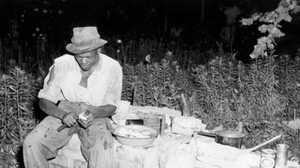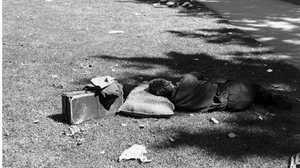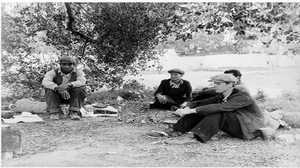Striking a Chord: Railroads and Their Musical Heritage

Since their first appearance on the American landscape, railroads -- and all the imagery they conjure up -- have featured prominently in works of popular art. Many a pulp novel, matinee movie, and Broadway melodrama has used the aura of the railroad to tell its tale. But it was through popular American music that railroads really made their mark.
As tracks began to snake their way across the continent during the 1800s, songs were composed to hail the coming of the Iron Horse, and to tell the tales of the laborers whose sweat made it possible. Whether in homage or testimony, railroad songs were populated by a colorful assortment of heroic engineers, lovers on the lam, grim-faced conductors, outlaws, brakemen, and bold adventurers. In time, another enduring character would be added to the cast: the humble hobo.
The "wanderer" was hardly a new arrival on the American scene; the itinerant drifter has been a recurring character throughout history. The railroads, however, presented the wanderer with the option of covering vast expanses of territory in relatively little time. For many, the urge to hop a train and ride it as far as it would take them was a form of wanderlust too powerful to resist. For others, the rails offered a way out of desperate situations. Whatever the reason, railroads -- and hobos -- provided plenty of material for good stories and even better song lyrics.
"The hobo works and wanders...the bum drinks and wanders"— so goes the credo of the hobo who was determined to be seen as something more than a lazy individual carelessly wasting a life. Many hobo hymns strive to convey the dignity of the individual and the gravity of their circumstances. In "The Poor Tramp Has to Live," songwriter Ernest V. Stoneman tells the sad tale of an elderly hobo who, because of poor health and advanced age, is no longer fit for employment:
"I am a poor old railroad man, once't a healthy section hand,
And old age is slowly creeping on the way;
Now hard times is coming on, and my last gold dollar is gone,
And this song is what I made to sing and play."
Serious social commentary was tempered by hobo songs extolling the freedom of the rails. George Reneau's "Wild and Reckless Hobos" captures the essence of what for some hobos was a grand adventure:
"My heart begin to roam around and I begin to sing,
If that freight train goes through this town, I'll catch it on a wing;
I pulled my cap down over my eyes and stepped up to the track,
I caught the stirrup of an empty car but never did look back."
Many of the best known hobo songs of the 1930s were written by urban sophisticates who never spent a moment in an open boxcar. Tunesmiths Waldo O'Neal ("Hobo Bill's Last Ride") and Carson Robinson ("The Railroad Boomer") had never themselves ridden the rails, but were nonetheless able to successfully create melodious scenarios featuring harmonizing hobos. Not all musical insight into the hobo existence was vicarious, however. The man who would one day be dubbed the "Father of Country Music," Jimmie Rodgers, gathered his material first-hand.
The son of a section foreman on the Mobile and Ohio Railroad, Rodgers went to work as a "water-boy" on the M&O at age 14. Many of his co-workers were African Americans who schooled Rodgers in the blues and taught him how to play banjo and guitar. Frail and sickly, Rodgers was forced to abandon his career as a railroad employee at age 24 when he contracted tuberculosis. The stories and melodies Rodgers learned while working the rails served as the basis of his new career. In short order he had made a name for himself as "The Singing Brakeman." From 1927 to 1933, when he died of TB at age 36, Rodgers recorded over 110 records on the Victor label, many featuring his trademark yodel. Among his catalog of hobo hits were "Big Rock Candy Mountain" and "Waiting for a Train," which captures the feelings of loneliness so often present in a hobo's life:
"Nobody seems to want me, or lend me a helping hand,
I'm on my way from Frisco, I'm going back to Dixie land;
Though my pocketbook is empty, and my heart is full with pain,
I'm a thousand miles away from home, just waiting for a train."
Rodgers was the first inductee to the Country Music Hall of Fame and part of the first group of inductees into the Rock and Roll Hall of Fame. On that occasion, singer/songwriter Bob Dylan remarked that Rodgers was "a performer of force without precedent, with a sound as lonesome and mystical as it was dynamic. He gives hope to the vanquished and humility to the mighty."







